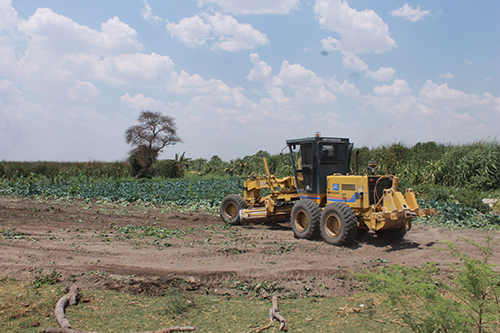Albertina Nakale
Despite being blessed with vast tracts of fertile land, Namibia’s agro-processing ideals remain a pipe dream. While other African nations, such as Ghana, announced that they will no longer export raw materials and instead intends to process more of their goods within national borders, Namibia’s dream of agro-processing still lies in the distant future.
Agriculture deputy minister Anna Shiweda, during a virtual meeting of the 2022 World Economic Forum in Davos, Switzerland, on agriculture investment opportunities in Namibia, said the nation needs to move beyond production to agro-processing.
“This might require expertise and experience that we do not currently have but will at the same time open new employment opportunities for our graduates who are currently underserved by the existing employment opportunities in the country,” she said.
The move towards agro-processing is one that has been accelerated among many nations in sub-Saharan Africa who suffered food shortages connected with trade disruptions during the Covid-19 pandemic.
Many nations on the continent, Namibia included, boast suitable climatic conditions that allow for the production of diverse agricultural commodities yet these same countries continue to rely on the import of large quantities of food and other agricultural products.
Experts say Namibia lacks the skills to capitalise on its resources and have not trained enough people in the right fields to improve the agro-processing landscape significantly.
Those who are qualified roam the streets looking for employment because investment in the agro-processing sector lacks.
In fact, according to Namibia Statistics Agency (NSA) data, only 20% of employed Namibians have vocational training or other forms of tertiary qualification.
According to Shiweda, this means that either Namibia is not producing graduates, or it is struggling to produce employment opportunities for graduates, or both.
Contacted for comment yesterday, senior lecturer in economics at the University of Namibia (Unam) Omu Kakujaha-Matundu expressed that what the minister is saying is in line with the government’s stance on value-addition.
However, he said, for Namibia to be more competitive within the African Continental Free Trade Area (AfCFTA) it needs to trade in manufacturing rather than exporting raw agricultural products.
“As for skills, the talk that we don’t have skills will take us many years. The young professionals and unskilled alike are getting impatient. They needed jobs yesterday and not in 10 years,” Kakujaha-Matundu added.
“Many of our graduates from NUST, Unam, IUM, and VTC are trainable and can be easily reskilled in a new vocation. Let’s look at the green schemes for instance. If a good PPP deal, where we have private and foreign investors with some government involvement. Having a say in policy related to employing Namibian professionals such as soil technicians, agriculturalists or engineers, we could in that sense take care of our young professionals and unskilled in the shortest possible time.”
Among the investment opportunities, Shiweda highlighted, include the government’s offer of investment opportunities in four brownfield green scheme projects and one dairy project to the domestic private sector.
At least 11 green scheme irrigation farms in Namibia will be put out on the market between now and July this year through a request for proposals (RFP).
They include the Orange River, Hardap, Etunda, Musese, Sikondo, Uvhungu-Vhungu, Ndonga-Linena, Mashare, Shadikongoro, Kalimbeza and Shitemo.
This also includes international investors with the capacity to operate the schemes through a competitive bidding process on a build operate and transfer (BOT) basis.
These are projects for which land is already secured. Although it is not an eligibility requirement, she said, joint ventures between local and foreign investors are encouraged and supported.
The green scheme programme encourages the development of irrigated agronomic production with a target to place approximately 27 000 hectares under irrigation.
The scheme sites are situated along the shared perennial rivers along Namibia’s borders where water is abundant.
The investments are expected to promote the production of grains (and cereals) as a basic staple food to reach food self-sufficiency while allowing investors to diversify production into high-value horticulture, crops, and fruits.
Director of Labour Resource and Research Institute (LaRRI) Michael Akuupa views the promotion of agriculture opportunities at the World Economic Forum as a step in the right direction in light of growing unemployment in Namibia specifically among the youth.
Akuupa argued at the moment, training output does not entirely relate to the economic skills required to address the fourth industrial revolution.
“So, there is a need to align and create synergies with the skill needs of the economy. In this instance, it is expected that when green schemes opportunities realise that they will move into a more advanced technological realm for which skills the country has not yet produced,” he recommended.
Hence, he suggests it is important that Namibia at this stage do a national skills audit to determine what new skills have emerged since.
According to him, there is a need to also determine what the total labour force is and what it looks like because there have not been labour force surveys done over the past few years.
He added with a lack of such information, it will be difficult to prepare the nation as it embraces new investments with advanced technology.
Akuupa cautioned the youth should also be ready to be retrained especially in environments of work in order to upskill their skills.
In the academic terrain, he advised institutions of training should constantly engage the economic sector so that they are able to identify the skills required for the market together and sync the training curricula respectively according to the needs of the economy.
“In absence of the above considerations, the youth will always be left out of the employment sphere as they will remain inadequately trained to access emerging job opportunities. So regular updates of how the labour force evolves will enable the government to create responsive policies that address the skills issue the economy,” he analysed.
–anakale@nepc.com.na
Pic: employment
Caption



